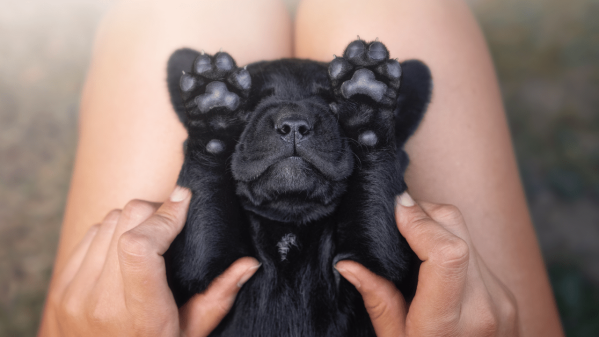You've probably noticed your pup licking their paws at some point. But you may wonder—is it normal for a dog to constantly lick their paws, or could it be a sign of something more serious?
It’s important to be on the lookout for a seemingly cute habit turning into a cry for help from your pup. But there are a few easy ways to spot if your dog is trying to tell you something or if they’re just going about their grooming routine.
Is paw licking normal in dogs?
Don’t panic just yet, as paw licking can be normal in some dogs as a way of self-grooming.
Dogs may chew or pluck at fur between their toes, lick to clean and remove debris, and remove any foreign material that may be irritating their skin. However, excessive paw licking and chewing can become an obsessive behavior that can lead to self-inflicted irritation and secondary infections.
To determine if this is normal or abnormal behavior, you should monitor the amount of time spent on the grooming and if it's after a normal experience (a walk outside) or when they're at rest. When the same area is licked often and for longer than about a minute, it's most likely an abnormal grooming behavior.
In light colored dogs, lick staining may appear in the areas where they're obsessively licking. A lick stain is produced when saliva is repeatedly deposited to the fur and porphyrn in the saliva causes the fur to turn brown-ish red.
Staining on fur from licking may indicate an underlying health issue. When joints ache, there is a pain source, or a skin lesion is aggravating them, stained fur will be concentrated in that area. If you're seeing lick stains on your dogs fur, talk to your veterinarian or a Pawp Professional to discuss what may be going on with your dog’s skin.
Why does my dog lick his paws?
There are many possible explanations for why your dog is licking his paws. These include:
A behavioral issue
Arthritis
Sores or dermatitis
Allergies or infections
Behavioral issue
As mentioned above, it could be an obsessive compulsive urge that is causing your dog’s licks. Usually, if you stop the dog repeatedly every time they start licking, they will stop and move onto doing something else. Pay attention to your dog tending to any one spot of the body and if their behavior changes over time.
Arthritis
Your dog may be experiencing pain or discomfort from arthritis. By licking the area, your dog is attempting to alleviate the pain or discomfort. If you notice this behavior, talk to your veterinarian about the potential for arthritis pain and starting a treatment plan.
Sores/dermatitis
Sores or contact dermatitis (Acral Lick Granuloma) is a health issue that a dog can create by licking a certain area over and over again for whatever reason. A lick granuloma is a self-inflicted wound that your dog causes by obsessive behavioral licking.
Allergies/infections
Just like arthritis, your dog could be feeling pain, tenderness, or other symptoms from allergies or existing infections.
How to stop paw licking in dogs
In order to stop your dog from licking their paws, you must first understand the underlying cause, which may require a trip to your veterinarian's office. Your veterinarian can examine your dog and help determine if the source of the licking is behavioral or medical.
After you've taken your dog to your veterinarian to determine the underlying cause, there are many things you can do at home to stop your dog's excessive licking.
An e-collar (cone) can be placed on your dog so they're unable to lick. A proper e-collar length should go past the nose about 2 inches.
Topical products can also help reduce the inflammation and create a bitter taste. If you feel your dog could benefit from a topical spray, reach out to your veterinarian or a Pawp Professional. Most of these products are sold over the counter and can be purchased in a pet store or online.
If you and your dog are active and enjoy going on hikes, walks, or even to the beach, make sure to check your dog's paws and hair for burrs, tar, foxtails, etc. to stop a problem before it starts. Be sure to check between the toes in the webbing.
If you live in a colder area that salts roads and sidewalks, be sure to clean their paws well when you return home.
If you find yourself constantly asking "Why does my dog lick his paws?", it may be time to reach out to a vet professional to get your pup the relief they need. The Pawp team is here to help 24/7.

Reviewed and fact-checked by
Mika, RVT at Pawp
